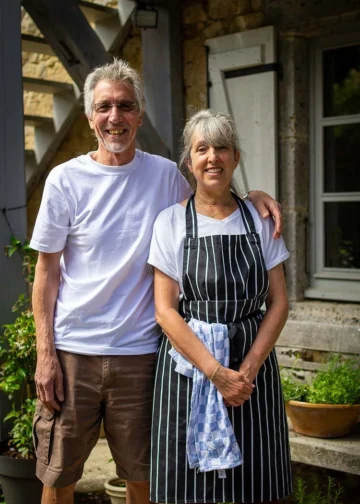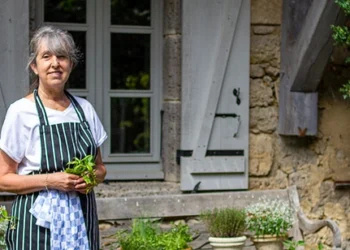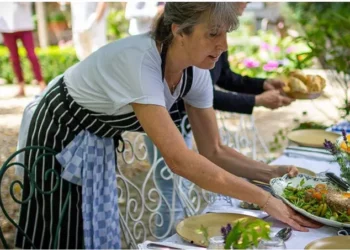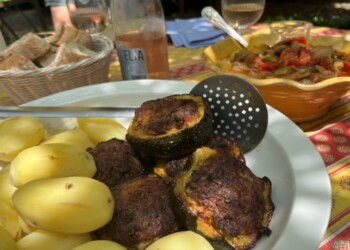Laura Washburn, a chef originally from California, and her British husband, Ian, moved to the village of Fourcès, in the Gers region of southwest France in 2020. Their route took them from L.A., to Paris, to London, before they finally came to settle here for retirement.
The Washburns were kind enough to invite me over for a homecooked lunch in their garden for their interview, giving me a taste of their life and some of the fabulous local cuisine, put to exquisite use by Laura …

Kat: What attracted you to this region?
Laura: How small and intimate it is here, it’s very friendly and alive. It’s quiet yet lively. Even during Covid, when we arrived, there were things to do… that said, the pace of life is slow and leisurely.
You’re living in a town but you still feel like you’re in the country. You hear owls and frogs at night. If you walk five minutes, you’re in the middle of a field.
Also the air quality is excellent, and the food is amazing.
Kat: Have you made friends? How did you manage it? And are they French or foreign?
Laura: Yes, we both have… the local pétanque club is a main social activity, as is tennis.
We’ve made friends with other foreigners and some locals. There are plenty of expats here from the U.K., America, and Belgium. A French gay couple are the social big-wigs here, and I’ve become good friends with them.
It’s this tiny village in the middle of fields, yet there’s this surprisingly international population. The owner of the town chateau is Spanish, for example, and he smokes meats and makes tapas, so there’s this little tapas bar that opens on weekends and is really authentic.
Kat: And how has your day-to-day routine evolved since you’ve gotten settled in?
Laura: We feel so much healthier in our lifestyle! We don’t feel like we retired and are just sitting on the couch waiting to die. We walk everywhere in our town, so we’re more active than we were in London.

Kat: What don’t you love about living here?
Laura: Winters are hard… it’s dark, cold, and foggy in January and February. Because so much of life is lived outdoors here, this region is at its best when you can be out and enjoy things. So after the first year we decided to leave for those two months.
And if you ask my husband, the main gripe is that “they all speak French.” It’s true, you need to speak French to live here—no one speaks English at all.
Start Your New Life Today, Overseas
Kat: Are there any other downsides you can think of?
Laura: It’s not the easiest place to get to… but I think that’s one of its attributes, too. It’s not overrun with tourists and because it’s not in the thick of things the population stays low, which is the charm of the place. It’s very undiscovered.

Kat: Aside from the need to make an effort with French, would you say there is any discrimination against foreigners? People often think the French hate Americans—have you found that to be the case here?
Laura: No, not at all. If anything, they are happy for the rejuvenation effect that foreigners have. We buy homes, shop locally, start businesses… they appreciate all that. They are happy for us bringing them business, and I think there’s some excitement with the fresh blood that comes in that they like. We definitely feel welcomed and appreciated.
It helps to have dogs… our dogs have helped us be introduced to other dog owners in the town, and people come up to pet them and chat for a minute when you stop.
There’s a very neighborly feeling here. Our neighbor is a big hunter and the other day he came back and handed us a pheasant over the fence! I didn’t really know what to do with it at first, but we managed and it was delicious!
Kat: Since moving, you’ve started a business—what is it you’re doing here?
Laura: I was a chef and cookbook writer by profession, and the produce and meats available here are so amazing that I started a business based on the local cuisine. My company, Atelier Cuisine Fourcès, does cheese tastings and market tours, bringing people to all the best shops and various markets, explaining the local goods and how best to use them in cooking. I also do cooking workshops, showcasing local ingredients and recipes.

Kat: Was it easy to find a home to buy here?
Laura: We looked at about 30 houses from here to the Burgundy region before finally finding this one. It’s in good condition, in the center of town, and we bought a lot of the furniture from the previous owner. We paid 290,000 euros for it, and it’s got three stories, three bedrooms, a massive kitchen, big, fully planted garden, little balconies and long veranda, and several rooms for studies or living spaces.
Kat: What’s a typical day like here?
Laura: Well that’s very different for a local than it would be for a foreigner coming to live here!
Locals are up by 4 a.m. and in bed by 8 or 9 p.m. every day. The typical Gascon breakfast is eaten after doing a few hours of farm work, around 10 or 11 a.m. and comes with a bottle of red wine. A shot of eau de vie comes at the end of every meal. These are really hardy people!
I’d say expats living here would get up at a reasonable time, but you do need to learn to adapt to the local meal times… you won’t be able to eat lunch past 1.30 p.m. or dinner past 8 p.m. in most places, for example. They still use air raid sirens to call people in from the fields for lunch at the same time every day. It’s very quaint.
Kat: Aside from meal times and speaking French, what do you think the biggest adjustment would be for newcomers?
Start Your New Life Today, Overseas
Laura: Probably the lack of business mentality—nothing will impose on personal time here. Business hours are short, days off are many, and there’s no drive to make money by working more.
Shopping is very different here than in the States or Britain. Aside from the business hours, you have to learn to shop like a local, which means going to all the different markets.
Another difference about meals here is that lunch is the big meal for the day. It’s multiple courses, not a sandwich or something else cold and easy, but fresh-cooked hot dishes. Then dinner is often just some bread and cheese.
Kat: Anything surprising about living here that you’ve fallen in love with?
Laura: The pétanque! It’s so much fun, and it’s the main pastime for most residents, so there are clubs for women and men, and people go out onto the square in summer and play for hours. It’s a great way to get to know your neighbors and make local friends.
I also love that the town cares so much about itself. It’s one of the “most beautiful towns in France,” and they take that title seriously.
There are about 15 committees here to maintain the town—one on planting gardens and beautification, one to plan events and festivals, another to improve business, one for the local arts, for the food markets… everyone here really gets involved to make this town the best it can be—and every town and village here is the same, Fourcès isn’t unique in that.
Kat: What about other pastimes? Are there any notable events you’d recommend?
Laura: The Fourcès annual flower festival is a huge deal. It’s usually in April and brings in about 7,000 visitors and it’s regionally famous. This is the 50th year of it, I think, so it’s quite an institution.
There’s a cinema in Condom, but the movies are usually only played dubbed in French. Once a week they run the original version.
Kat: Any tips for finding other expats?
Laura: There’s a Facebook group called “Gers English speaking community” that’s a good hub for finding expats in the general region. Also “Gascogne Ladies Club.”
There’s a golf club, ceramics and weaving classes, and lots of other classes and workshops, they aren’t in English but expats attend them and it’s a good place to meet people, both locals and expats.
Bonne route,

Kat Kalashian
Editor, In Focus: Europe
P.S. Today’s dispatch was a snippet from my full write up on this undiscovered haven, which appeared in our Overseas Retirement Index for the first time this year.










